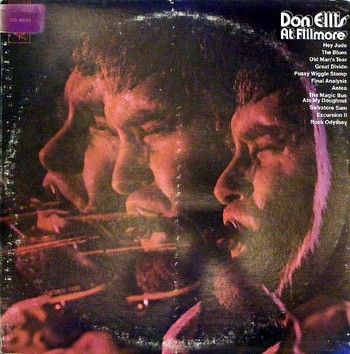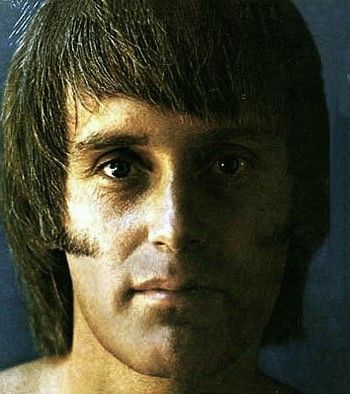
Don Ellis - Don Ellis At Fillmore - 1970 - Columbia
This is a crazy and consistently riotous two-disc set that features the Don Ellis Orchestra at its height. The 20-piece orchestra (with trumpeter Ellis doubling on drums along with a regular drummer and two percussionists) often used electronic devices (such as ring modulators) at the time to really distort its sound. When coupled with odd time signatures and such exuberant soloists as Ellis, trombonist Glenn Ferris, tenor saxophonist John Klemmer (showcased on the remarkable "Excursion II"), guitarist Jay Graydon, altoists Fred Selden and Lonnie Shetter, and tenor Sam Falzone, the results are quite memorable. Highlights of the date include "Final Analysis" (which contains a countless number of false endings), a bizarre rendition of "Hey Jude," and an often hilarious remake of "Pussy Wiggle Stomp." In 2005, the Wounded Bird label reissued this session on CD for the first time. Unfortunately, no bonus tracks were available. © Scott Yanow & Al Campbell, allmusic.com
Recorded live at Bill Graham's Fillmore West, in June, 1970, this album includes many of the late Don Ellis' most popular works, including: "Pussy Wiggle Stomp," "Final Analysis," the "Great Divide." , and an experimental version of "Hey Jude" that you will either love -- or shoot the trumpet player! Either way, you've got to admire Don Ellis' amazing interpretation of the sacrosanct Beatle's song. Don was famous for his unorthodox time signatures, and his innovative contemporary jazz sound with it's blend of swing, jazz, rock, classical, big band, and world elements, and "At The Fillmore" gives you a taste of all that, and more. Listen to Don Ellis' great "Autumn" album which is a classic of contemporary jazz. . Check out Don Ellis Recordings for a wealth of detailed information on Don Ellis. There is also a comprehensive review of this album @ AAJAZZ/REVIEW Read his biography @ DELLIS/BIO For music in a similar vein, listen to Tom Scott's 1975 "New York Connection" album.
TRACKS / COMPOSERS
A1 Final Analysis - Don Ellis
A2 Excursion II - John Klemmer
A3 The Magic Bus Ate My Doughnut - Fred Selden
B1 The Blues - Don Ellis
B2 Salvatore Sam - Don Ellis
B3 Rock Odyssey - Hank Levy
C1 Hey Jude - Lennon-McCartney
C2 Antea - Hank Levy
C3 Old Man's Tear - John Klemmer
D1 Great Divide - Don Ellis
D2 Pussy Wiggle Stomp - Don Ellis
MUSICIANS
Trumpet, Drums - Don Ellis
Guitar - Jay Graydon
Bass - Dennis Parker
Piano - Tom Garvin
Drums - Ralph Humphrey
Percussion, Drums - Ron Dunn
Congas - Lee Pastora
Trombone, Bass [Contra], Tuba - Doug Bixby
Trombone, Bass - Don Switzer
Trombone - Ernie Carlson , Glenn Ferris
Trumpet - Glenn Stuart , Jack Coan , John Rosenberg , Stu Blumberg
Saxophone - Fred Selden , John Klemmer , Jon Clarke , Lonnie Shetter , Sam Falzone

BIO
A talented trumpeter with a vivid musical imagination and the willingness to try new things, Don Ellis led some of the most colorful big bands of the 1965-75 period. After graduating from Boston University, Ellis played in the big bands of Ray McKinley, Charlie Barnet, and Maynard Ferguson (he was featured with the latter on "Three More Foxes"), recorded with Charles Mingus, and played with George Russell's sextet (at the same time as Eric Dolphy). Ellis led four quartet and trio sessions during 1960-1962 for Candid, New Jazz, and Pacific Jazz, mixing together bop, free jazz, and his interest in modern classical music. However it was in 1965 when he put together his first orchestra that he really started to make an impression in jazz. Ellis's big bands were distinguished by their unusual instrumentation (which in its early days had up to three bassists and three drummers including Ellis himself), the leader's desire to investigate unusual time changes (including 7/8, 9/8, and even 15/16), its occasionally wacky humor (highlighted by an excess of false endings), and an openness towards using rock rhythms and (in later years) electronics. Ellis invented the four-valve trumpet and utilized a ring modulator and all types of wild electronic devices by the late '60s. By 1971, his band consisted of an eight-piece brass section (including French horn and tuba), a four-piece woodwind section, a string quartet, and a two-drum rhythm section. A later unrecorded edition even added a vocal quartet. Among Don Ellis's sidemen were Glenn Ferris, Tom Scott, John Klemmer, Sam Falzone, Frank Strozier, Dave MacKay, and the brilliant pianist (straight from Bulgaria) Milcho Leviev. The orchestra's most memorable recordings were Autumn, Live at the Fillmore, and Tears of Joy (all for Columbia). After suffering a mid-'70s heart attack, Ellis returned to live performing, playing the "superbone" and a later edition of his big band featured Art Pepper. Ellis's last recording was at the 1977 Montreux Jazz Festival, a year before his heart finally gave out. © Scott Yanow, allmusic.com





